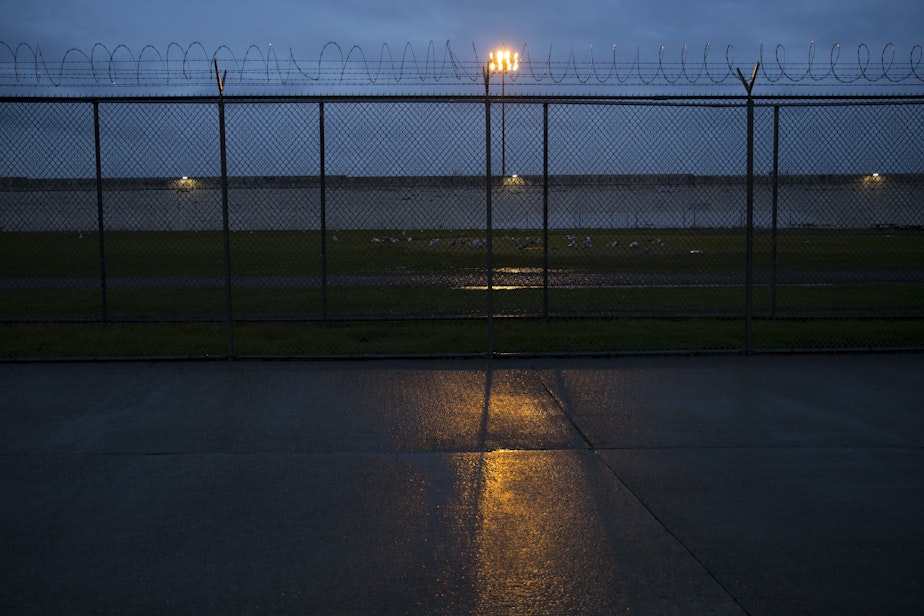Coronavirus cases climb at Monroe prison, as advocates beg state to quickly decrease population

Three prison inmates in Washington have now tested positive for COVID-19, all of them at the Monroe Correctional Complex just outside Seattle.
Meanwhile, advocates are calling for some inmates to be released, and for the Department of Corrections to make big changes to keep inmates healthy.
KUOW’s Olympia correspondent Austin Jenkins brings us the latest.
This interview has been lightly edited for clarity.
We learned about the first case on Sunday. What can you tell us about the situation in Washington's prison system?
Certainly at Monroe, I think things have notched up in terms of intensity and alertness. Now what you have are positive tests coming back on individuals who are incarcerated there. In addition, there are 17 inmates in this minimum-security unit who are in isolation, which means they are showing symptoms.
It may be in the coming days we're going to find out that more inmates are testing positive. There are another 111 men in this minimum-security unit who are in protective isolation. They may have been exposed and now they're being kept in their cells, for the most part, during the day.
I should note that previously, three staff members at that prison tested positive. Overall, across the entire system--12 prisons and 12 work release centers-- at least 12 staff members have tested positive.
We're starting to see a shift from it being mostly contained to staff to now we're seeing a particular prison with inmates testing positive. We'll just have to see where it goes.
As you've been reporting, several groups have been pushing for the state to reduce the number of people in our prisons right now. What specifically are they looking for?
It's groups like Disability Rights Washington, the ACLU of Washington and Columbia Legal Services. They have been pushing the state to rapidly decrease the prison population.
Right now, we have about 17,000 inmates in those 12 prisons I just mentioned, and the prison system is running at about 100% of capacity. You've got a lot of inmates in two-person cells. I've even heard about three people being together in one cell with one sleeping on the floor at the Washington Corrections Center in Shelton, which is the intake facility.
These groups have sent letters to the governor, the Secretary of Corrections. Essentially, they want older inmates, those with underlying health conditions, and those nearing their release date, to be let out early, with the idea that it would protect those inmates and it would reduce the census, and perhaps reduce the chance of Covid-19 spreading in a prison.
I understand it's not just early release. Advocates are also looking for changes inside the prisons. What are they calling for?
There's a group called The Washington Coalition for Prison Reform that has the support of at least a couple of Democratic state lawmakers. They want alcohol-based hand sanitizer to be allowed in the prisons. Of course, alcohol-based would normally be a contraband, but under the circumstances, they're saying that that restriction should be lifted.
They want testing available for all incarcerated individuals with symptoms. They want a special quarantine unit created instead of what they say is happening now as people who have symptoms are, in essence, being put in solitary confinement or in isolation. They don't think that's fair.
They also want the prison system to do more to make it easier for families to keep in touch with people on the inside because visitation has been suspended while this is all going on.
What has the Department of Corrections told you about what they're doing to keep inmates and their staff members safe from COVID-19?
It says that they're doing a lot and that they have an emergency operation center that's up and running 24 hours a day and has been for many weeks now.
As I mentioned, they've halted visitations. Staff are now screened and their temperature is taken when they arrive for work. They're doing extra sanitizing in the prisons. They are enforcing social distancing.
Recently, the agency started issuing expired N95 masks to front line staff who were in contact with incarcerated individuals. They're also encouraging inmates who are a particular risk for complications to self-quarantine and to limit their movement in the prison.
So far, what I've heard from the Secretary of Corrections is he feels like they have things under control and are managing through this, and feel pretty confident about the protections and the systems they've put in place. From families, I'm hearing less confidence.
I know you've talked with experts about how vulnerable prison inmates are during a pandemic. What are you hearing about this one?
Certainly, when you talk to the public health experts and people with a background in healthcare in prisons and jails, they say that they are kind of like petri dishes. I've heard it described as like a cruise ship, but a cruise ship where 10 people get on and off every day, because you've got people coming and going.
As you look across the country -- take the Cook County Jail in Chicago, for example, where they've got an outbreak -- there is the potential, just like in nursing homes, for this to flare up, to spread quickly. It can be very hard to contain and control.
Editor's note: after our interview aired Monday afternoon the Washington Department of Corrections announced three additional inmates at the Monroe Correctional Complex had tested positive for COVID-19, making six the total number of cases.
Listen to the interview by clicking the play button above.





